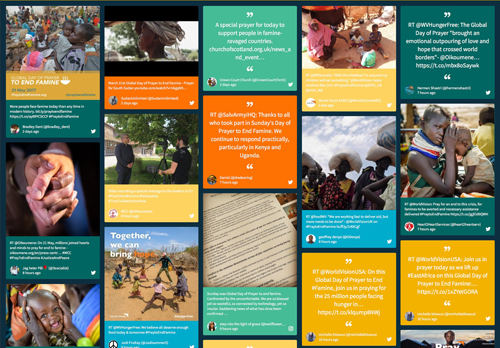
MARIANNE EJDERSTEN, director of communication at the World Council of Churches, reflects on responses to the Global Day of Prayer to End Famine…
On 21st May – observed as the Global Day of Prayer to End Famine – millions of people from faith communities, organisations and neighborhoods across the world prayed, tweeted, posted and talked face-to-face about the urgent action needed to aid 20 million people facing famine in South Sudan, Somalia, Yemen and Nigeria.
Led by the World Council of Churches and the All Africa Conference of Churches, the Global Day of Prayer brought an emotional outpouring of love and hope that crossed world borders via social media, news headlines and quiet circles of prayer rippling out from churches everywhere.

Images from the day’s official ‘prayer wall’.
Led by the World Council of Churches and the All Africa Conference of Churches, the Global Day of Prayer brought an emotional outpouring of love and hope that crossed world borders via social media, news headlines and quiet circles of prayer rippling out from churches everywhere.
Responders, residents, relief workers, families – many have loved ones either caught up in the crisis or responding to it.
Those praying urged action on the part of the Group of Seven (G7), which will soon meet in Italy to discuss, among other issues, global food security.
The number of people globally in need of food assistance has risen 35 per cent in the last year, from 80 to 108 million people.
Standing with those caught up in the crisis, people prayed for peace, and for a galvanised international response to what the UN has called the worst humanitarian crisis since 1945.
People were asked to pray for the mobilisation of funding to meet the funding gap for the aid response (only $US1.3 billion of the $US4.9 billion needed for an international aid response as been received); for more to be done to foster peace; and for the drivers of extreme hunger (including climate change) to be addressed.
Dozens of people also shared a quote from World Food Programme country director, Joyce Luma, in South Sudan: “Humanitarian assistance alone is not enough. If conflict continues, the scale and intensity of needs may escalate and outstrip the ability of relief agencies to meet them.”
In East Africa, the South Sudan Council of Churches encouraged all churches in the country to join the global prayer event. Famine has already been declared in parts of South Sudan. Nigeria, Yemen and Somalia are at imminent risk of famine.
As I write this, responses continued to be posted, and the Global Day of Prayer has left a lasting response that has great potential to bring about change.
Angelo Achuil, faith and development coordinator for World Vision South Sudan said: “Christians in South Sudan have been praying for peace and safety – and for their children to have a future free from violence. Congregations are desperate for an end to the starvation, conflict and displacement that are tearing apart their communities. They are grateful for the prayers of the global church and want people of faith to continue praying. But they also want them to cry out to their leaders to bring justice and peace and to provide the emergency aid that will help them survive this crisis. They feel like the world has forgotten them.”
The Uniting Church in Australia, as part of celebrating 40 years as a uniquely Australian church, included the Global Day of Prayer to End Famine within its 40 days of prayer from 14th May to 22nd June.
In a message to the worldwide Salvation Army, international leader General André Cox called on Salvationists and friends to respond “through our actions, not just our words”.
The Canadian Foodgrains Bank promoted a collective response as people enjoyed a meal. “As we share our supper tonight let us pray together to respond and end hunger on the Global Day of Prayer to End Famine.”
Choice Souls Media in Nigeria based its response on Psalm 112:7. “Lord, we trust in the covenant you have over Nigeria, we refuse to be afraid of the famine, recession, corruption, bad leadership, wickedness in high places. We pray in faith and we trust you for a turn around and for perfecting all that concerns Nigeria.”
Advocate Sarah Park found a new perspective on second helpings of food, and began setting an empty plate next to her own whenever she sets the table. “When I learned that 20 million people are currently facing famine in East Africa, it was a difficult number to comprehend and be moved to action.” she wrote. “Every time I sit down for a meal in the months to come, by setting an extra empty plate, I am convicted to pray and donate to those afflicted by food insecurity and famine in East Africa, and I am reminded that why I may not have the power to feed 20 million, I can be a blessing to one.”
A blessing to one can become a blessing to the world. We urged you to continue to respond to famine until all have enough.
Marianne Ejdersten is director of communication for the World Council of Churches.





